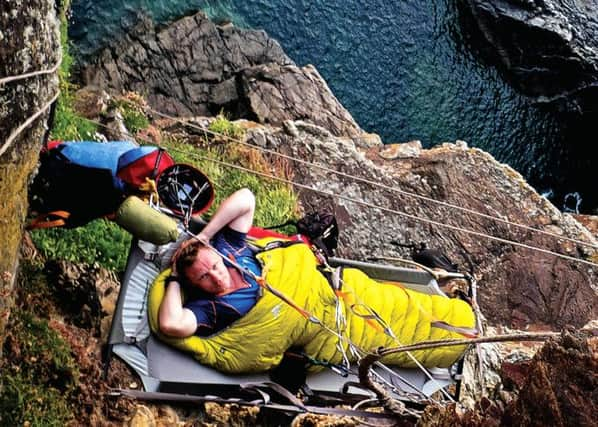Andy Torbet on the joys of exploring


With childhood passions including scuba diving and climbing, Andy Torbet was never going to settle for a sedentary office job. After completing a degree in zoology, Torbet joined the military, and when a Marines training exercise led him to become temporarily paralysed in one leg, he redirected his energies to the military’s Royal Engineers. Before long he was an underwater bomb disposal commander, so it’s a bit of an understatement to say that Torbet is up for a challenge.
Leaving the army, he decided to become an expedition leader, and from his adventures – battling icebergs, extreme diving and skydiving to name a few – has come a career in front of the camera.
Advertisement
Hide AdA presenter for both The One Show and Coast, Torbet has his fair share of “don’t try this at home” stories to share, including one about the ominously named Cave of Skulls in the West Highlands.
“It’s genuinely called that, very Indiana Jones-esque,” he laughs. “The first guy went there and investigated in 1976 and no-one’s been back since... so I took it upon myself to go and monkey about in the caves for a few days.”
That’s putting it lightly. Torbet’s solo encounter saw him tackle total darkness, ultra-cramped spaces and navigate unknown conditions.
“Cave diving is one of those things that appears to be incredibly dangerous but actually if done properly, it isn’t. I always say it’s a bit like crossing the road: if you’re aware of what you’re doing, then you’ll probably get across OK. The thing with cave diving is it’s a sport in which you’re in an incredibly controlled environment, albeit psychologically it’s pretty much the most oppressive environment you could be in because it’s cold, dark and claustrophobic – and underwater.
“I always say that the best approach is to be as paranoid as possible before you get in the water so that once you’re in, you can relax. By that I mean you go through every possible scenario that could go wrong while you’re down there and to have a plan in case it does happen. And if you do that properly, theoretically you should be safe as houses.”
Britain has had its fair share of intrepid explorers over the years, so does Torbet think we’re running out of firsts, or do we just have to push the envelope that much further?
Advertisement
Hide Ad“It’s harder to find terrestrial firsts as a lot of land has been explored,” he says. “I think there’s been a shift of genuine exploration – people going away to bring back new knowledge and discoveries and scientific understanding – and instead there’s been a slight shift toward stunt-based adventure. Now you always need sponsors and a lot of sponsors are after YouTube-based stunt adventure rather than pure discovery as in the Victorian age.
“The flipside of that is underwater, which is one of the reasons I love diving because that is where there’s absolutely massive potential for exploration. I reckon less than half a per cent of the world’s caves have been explored, and a tiny fraction of the world’s shipwrecks have ever been found and explored. There’s masses of species to be found underwater so there’s still bags of potential for genuine exploration if you look in the right places.”
Advertisement
Hide AdWhat’s more, the unexplored corners of our planet might be closer to home than expected. “I’ve been doing things like climbing Britain’s tallest tree, deep diving to a new mystery unknown wreck, a bit of avalanche stuff in Scotland in the winter,” says Torbet.
He encourages novice explorers. “I try to suggest things that anyone can do – if you want to do genuine adventure projects you can do it right here in the UK with something as simple as a snorkel,”he says. “It could be camping in Dartmouth, taking that first step. There’s masses out there still to do in the UK.”